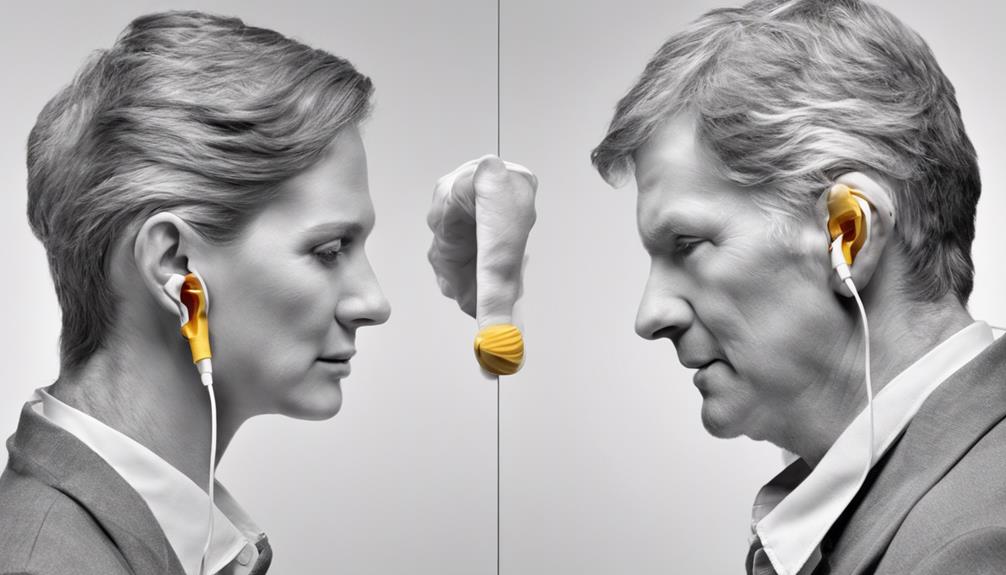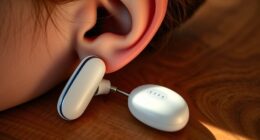When dealing with the intricate world of hearing aids, it is important to acknowledge a concerning fact: if not handled properly, these devices could potentially cause more harm to your hearing.
Imagine relying on a tool meant to assist your hearing, only to inadvertently harm it instead. The delicate balance between amplification and protection is key in this scenario.
Let's delve into the nuanced ways in which hearing aids, designed to enhance our auditory experiences, could paradoxically pose risks to our hearing health if not meticulously managed and monitored.
Key Takeaways
- Improper usage can lead to discomfort and pain, causing potential hearing damage.
- Neglecting maintenance can result in infections and affect hearing aid performance.
- Over-reliance on hearing aids may impact natural auditory processing and adaptability.
- Proactive care, correct fitting, and regular monitoring are vital to prevent hearing loss risks.
Risks of Improper Hearing Aid Usage
Improper usage of hearing aids poses significant risks to individuals' ear health and can exacerbate existing hearing issues if not addressed correctly. When individuals wear hearing aids that are improperly fitted, it can lead to discomfort and even pain in the ear canal.
Moreover, if the hearing aids are incorrectly adjusted, they may amplify sounds to damaging levels, potentially causing further hearing loss. Prolonged use of hearing aids at high volumes also increases the risk of noise-induced hearing loss.
Additionally, failing to clean and maintain hearing aids properly can result in ear infections and potential damage to the ear, further complicating the issue. Without professional guidance on how to wear hearing aids correctly, individuals might unknowingly misuse them, inadvertently worsening their hearing condition.
It's crucial to address these risks to improve the quality of life for those with hearing loss.
Understanding Over-Reliance on Hearing Aids

When relying heavily on hearing aids, individuals risk diminishing their natural auditory stimulation, potentially hindering the brain's independent processing of sounds. This over-reliance on hearing aids can have several negative implications, including:
- Decreased natural auditory stimulation
- Reduced brain's ability to process sounds independently
- Potential contribution to auditory deprivation
- Impact on the brain's adaptability to different sound environments
It is crucial to strike a balance between using hearing aids and allowing for periods of natural hearing. By doing so, individuals can prevent over-reliance on these devices and help maintain the brain's natural ability to hear and interpret sounds effectively.
Regular breaks from hearing aid usage can aid in preserving the brain's capacity to process auditory information, promoting overall auditory health and well-being.
Effects of Incorrect Hearing Aid Care
Regular maintenance and proper care of hearing aids are essential to ensure optimal performance and longevity of the devices. Improper cleaning techniques can lead to the buildup of earwax and bacteria, increasing the risk of ear infections and potential damage to both the hearing aids and the ear canal.
Neglecting to replace wax guards and filters on a regular basis can significantly impact the sound quality of the devices, affecting the user's ability to hear clearly. Additionally, failing to maintain hearing aids properly can result in malfunctions caused by exposure to humid or dusty environments, reducing the lifespan of the devices.
Regular maintenance and professional check-ups are crucial in preventing complications and potential hearing damage. By prioritizing correct care practices, individuals can ensure that their hearing aids function effectively and contribute to preserving their overall hearing health.
Preventing Hearing Loss Proactively

To proactively prevent hearing loss, timely intervention with appropriate hearing aids is crucial for maintaining optimal hearing abilities. Here are some essential steps to consider for proactive prevention:
- Regular Hearing Tests: Scheduling routine hearing tests can help in early detection of any hearing loss, allowing for timely intervention with suitable hearing aids.
- Properly Fitted Hearing Aids: Ensuring hearing aids are correctly fitted and used as prescribed can prevent further deterioration of hearing abilities.
- Regular Monitoring by Audiologists: Ongoing monitoring and adjustments by audiologists are essential to maintain optimal hearing aid performance and address any changes in hearing needs promptly.
- Preservation of Healthy Hearing: Early detection of hearing loss and the prompt use of hearing aids can prevent long-term damage, preserving and protecting healthy hearing function over time.
Longevity of Hearing Aid Health
Maintaining the health and longevity of hearing aids requires diligent care and adherence to proper maintenance practices. Regular cleaning and maintenance play a vital role in preventing issues that could potentially impact hearing health. Following the manufacturer's guidelines for battery replacement and storage is crucial for extending the life of hearing aids. Additionally, ensuring proper fitting by audiologists is essential for optimal function and reducing the risk of discomfort or damage.
Seeking professional help for adjustments or repairs is another key aspect of maintaining the effectiveness of hearing aids and preventing potential issues that could affect their longevity. By regularly consulting with professionals and following recommended care practices, individuals can promote the longevity of their hearing aids while also safeguarding their hearing health.
Frequently Asked Questions
Can Hearing Aids Cause Loss of Hearing?
Yes, hearing aids can cause hearing loss if improperly used. It's crucial to follow proper fitting instructions and have regular check-ups with an audiologist to prevent any potential issues.
Excessive volume settings or malfunctioning devices can contribute to further damage. Ensuring professional maintenance and guidance will help mitigate risks and ensure the effectiveness of hearing aids in improving hearing without causing harm.
Regular consultations with experts are key to safe and optimal hearing aid usage.
What Is the Most Common Cause of Hearing Loss?
Exposure to loud noise, whether sudden or prolonged, is the most common cause of hearing loss. Activities like listening to loud music, operating machinery, or attending concerts can lead to noise-induced hearing loss.
This damage occurs when the delicate hair cells in the inner ear are harmed by loud sounds, resulting in permanent hearing loss. To prevent this, it's essential to use ear protection, reduce exposure to loud sounds, and take breaks from noisy environments.
What Is the Biggest Problem With Hearing Aids?
The biggest problem with hearing aids is their potential to harm our hearing if not properly fitted and calibrated. Exaggerating the issue helps emphasize the risks involved. Without expert adjustments and overuse at high volumes, hearing aids can worsen our ability to hear. Seeking professional guidance is crucial to prevent further damage.
It's essential to be aware of these risks and take the necessary precautions to safeguard our hearing health.
What Are the Disadvantages of Hearing Aids?
Sure, the disadvantages of hearing aids can include discomfort from improper fitting, amplification of background noise, potential further hearing damage from high volumes, feedback noises from lack of maintenance, and the risk of ear infections due to inadequate cleaning.
It's crucial to address these issues through proper fitting, volume adjustment, maintenance, and hygiene practices to maximize the benefits of hearing aids while minimizing these drawbacks.
Conclusion
In conclusion, it's crucial to remember that while hearing aids can greatly improve our quality of life, they also come with potential risks if not used correctly. By staying informed, seeking professional guidance, and practicing proper care, we can prevent hearing loss and ensure the longevity of our hearing aids.
Remember, an ounce of prevention is worth a pound of cure! So let's take care of our hearing health to enjoy all the sounds life has to offer.











